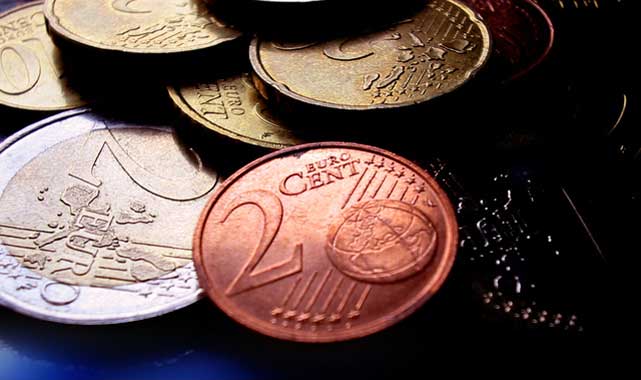Pound to Euro Week Ahead Forecast: 1.17 for Now, 1.1495-1.2050 Long-Term
February 11, 2024 - Written by John Cameron

Foreign currency experts at Goldman Sachs expect that the Pound-Euro exchange rate will strengthen to 1.2050 at the end of 2024 before a limited correction to 1.1765 at the end of 2025.
In contrast, RBC Capital Markets expects that GBP/EUR will decline to 1.1495 by the end of 2024 with a slide to 1.0640 by the end of 2025.
GBP/EUR found support below 1.17 during the week and closed almost unchanged at 1.1715 with generally tight ranges.
Economic fundamentals and the outlook for interest rates will remain a key element for both the Pound and Euro.
The UK economic data releases have been broadly positive over the week.
There was a further improvement in the RICS housing index to the highest level since November 2022 while Halifax reported a further increase in house prices for January.
The final reading for the PMI services-sector index was also revised higher to an 8-month high of 54.3.
ING commented; “The UK economic outlook has started the year on a brighter footing. Green shoots are appearing in some of the sentiment indicators; most notable is the services purchasing manager’s index (PMI), which has edged further into growth territory. That’s at odds with the wider eurozone, where the sector is still – at least judging by this survey – in modest contraction.
The bank added; “After a year of stagnation – and perhaps even a very modest technical recession in the second half – we’re expecting modest and incremental positive quarterly growth through this year.”
Bank of England expectations will remain a key element with markets pricing in around a 60% chance of a rate cut in June.
The two MPC members who voted for a rate hike at February’s BoE policy meeting showed no remorse on Thursday amid on-going concerns surrounding underlying inflation.
Haskel noted that some progress had been made on inflation, but added; "The signs that we've seen thus far are encouraging. I don't think we've seen quite enough signs yet.”
He did outline the framework for a change in stance; “if we accumulate more evidence on persistence [for lower inflation], then by the very logic I've just set out, I'd be happy to change my vote."
He said his decision last week had been "finely balanced," but he wanted to wait a bit longer to accumulate more evidence on that persistence.
The Pound will tend to gain net support if the BoE continues to resist near-term interest rate cuts.
According to Goldman Sachs; “Sterling has benefited considerably from the global disinflation trend and shift toward policy easing. Both of these factors have helped support Sterling via better risk sentiment and by making the Bank of England less of a dovish outlier.”
There are still important reservations surrounding the UK fundamentals.
According to RBC; “On fiscal policy, no matter what the makeup of the new government will be, the new administration will inherit a constrained fiscal environment, where the spending profile is already tight and demand for public services is increasing.”
It added; “Any deterioration in policy credibility would leave GBP vulnerable, with the UK becoming more dependent on large inflows of short-term capital to fund its current account deficit.”
The Euro-Zone services sector remained in contraction for January, although there has been tentative evidence that conditions are bottoming out.
According to RBC on the Euro-Zone; “For sure there are plenty of downside risks for European growth/EUR (war in the Middle East, disrupted shipping via the Red Sea, cyclical weakness in China, a structural shift in China away from EZ exports, a deep slowdown in core European manufacturing).”
It does, however, note that a substantial amount of bad news has been priced in; “the hurdle for some upside surprises is also pretty low. Our European economists note that as inflation comes down, with unemployment at historic lows, real incomes are rising and domestic demand is likely to improve.”
ECB policy will be a key element for the Euro.
According to HSBC; “Going forward, the policy rate outlook will depend on future inflation and wage data. We expect the ECB to be on hold until the middle of the year before cutting rates in June. We then see 25bp cuts every other meeting, though perhaps the risks of a steeper cutting cycle are growing.”
NatWest added; “Our conviction that the ECB cuts either in April or June is high. Our base case is that the ECB cuts in June by 50bp, but April remains a risk event.”
SocGen expects the ECB will wait until June; “While Lagarde seemed to downplay the need to wait until 1Q data becomes available, we still see little chance the ECB could materially revise down its 2025 unit labour cost forecast (2.6%) already in March, and thus likely will need to wait until the June staff forecasts to be sure that wage trends are easing sufficiently and supporting a sustainable return to the 2% inflation target.”
STORY LINK Pound to Euro Week Ahead Forecast: 1.17 for Now, 1.1495-1.2050 Long-Term

Foreign currency experts at Goldman Sachs expect that the Pound-Euro exchange rate will strengthen to 1.2050 at the end of 2024 before a limited correction to 1.1765 at the end of 2025.
In contrast, RBC Capital Markets expects that GBP/EUR will decline to 1.1495 by the end of 2024 with a slide to 1.0640 by the end of 2025.
GBP/EUR found support below 1.17 during the week and closed almost unchanged at 1.1715 with generally tight ranges.
Economic fundamentals and the outlook for interest rates will remain a key element for both the Pound and Euro.
The UK economic data releases have been broadly positive over the week.
There was a further improvement in the RICS housing index to the highest level since November 2022 while Halifax reported a further increase in house prices for January.
The final reading for the PMI services-sector index was also revised higher to an 8-month high of 54.3.
ING commented; “The UK economic outlook has started the year on a brighter footing. Green shoots are appearing in some of the sentiment indicators; most notable is the services purchasing manager’s index (PMI), which has edged further into growth territory. That’s at odds with the wider eurozone, where the sector is still – at least judging by this survey – in modest contraction.
The bank added; “After a year of stagnation – and perhaps even a very modest technical recession in the second half – we’re expecting modest and incremental positive quarterly growth through this year.”
Bank of England expectations will remain a key element with markets pricing in around a 60% chance of a rate cut in June.
The two MPC members who voted for a rate hike at February’s BoE policy meeting showed no remorse on Thursday amid on-going concerns surrounding underlying inflation.
Haskel noted that some progress had been made on inflation, but added; "The signs that we've seen thus far are encouraging. I don't think we've seen quite enough signs yet.”
He did outline the framework for a change in stance; “if we accumulate more evidence on persistence [for lower inflation], then by the very logic I've just set out, I'd be happy to change my vote."
He said his decision last week had been "finely balanced," but he wanted to wait a bit longer to accumulate more evidence on that persistence.
The Pound will tend to gain net support if the BoE continues to resist near-term interest rate cuts.
According to Goldman Sachs; “Sterling has benefited considerably from the global disinflation trend and shift toward policy easing. Both of these factors have helped support Sterling via better risk sentiment and by making the Bank of England less of a dovish outlier.”
There are still important reservations surrounding the UK fundamentals.
According to RBC; “On fiscal policy, no matter what the makeup of the new government will be, the new administration will inherit a constrained fiscal environment, where the spending profile is already tight and demand for public services is increasing.”
It added; “Any deterioration in policy credibility would leave GBP vulnerable, with the UK becoming more dependent on large inflows of short-term capital to fund its current account deficit.”
The Euro-Zone services sector remained in contraction for January, although there has been tentative evidence that conditions are bottoming out.
According to RBC on the Euro-Zone; “For sure there are plenty of downside risks for European growth/EUR (war in the Middle East, disrupted shipping via the Red Sea, cyclical weakness in China, a structural shift in China away from EZ exports, a deep slowdown in core European manufacturing).”
It does, however, note that a substantial amount of bad news has been priced in; “the hurdle for some upside surprises is also pretty low. Our European economists note that as inflation comes down, with unemployment at historic lows, real incomes are rising and domestic demand is likely to improve.”
ECB policy will be a key element for the Euro.
According to HSBC; “Going forward, the policy rate outlook will depend on future inflation and wage data. We expect the ECB to be on hold until the middle of the year before cutting rates in June. We then see 25bp cuts every other meeting, though perhaps the risks of a steeper cutting cycle are growing.”
NatWest added; “Our conviction that the ECB cuts either in April or June is high. Our base case is that the ECB cuts in June by 50bp, but April remains a risk event.”
SocGen expects the ECB will wait until June; “While Lagarde seemed to downplay the need to wait until 1Q data becomes available, we still see little chance the ECB could materially revise down its 2025 unit labour cost forecast (2.6%) already in March, and thus likely will need to wait until the June staff forecasts to be sure that wage trends are easing sufficiently and supporting a sustainable return to the 2% inflation target.”
International Money Transfer? Ask our resident FX expert a money transfer question or try John's new, free, no-obligation personal service! ,where he helps every step of the way, ensuring you get the best exchange rates on your currency requirements.
TAGS: Pound Euro Forecasts
Comments are currrently disabled
Related Stories:
- Pound to Euro Forecast For Week Ahead: Where Next for GBP/EUR? - April 28, 2024
- Pound to Euro: Back Above 1.1625, Short-Term Stabilisation Ahead - April 24, 2024
- Pound to Euro Week Ahead Forecast: 1.1240-1.2050 12-Month Ranges - April 21, 2024
- Pound to Euro Nears 1.1720 After Mixed UK Jobs Data - April 16, 2024
- Pound to Euro Week Ahead Forecast: Retreat to 1.17, Fundamental Debate Continues - April 14, 2024
- Pound to Euro Rate Outlook: Lagarde to "pre-announce" June rate cut - April 11, 2024
- Pound to Euro Week Ahead Forecast: 1.156-1.19 Range This Year - April 7, 2024
- Pound to Euro Exchange Rate Close to One-Week Lows as UK/Euro-Zone Performance Gap Narrows - April 5, 2024
- Pound to Euro Rate Edges Above 1.1700 - GBP/EUR Forecast - April 2, 2024
Latest News:
- Pound to Euro Forecast For Week Ahead: Where Next for GBP/EUR? - April 28, 2024
- Pound to Dollar Week Ahead Forecast: "Further GBP Weakness in Coming Weeks" - April 28, 2024
- Euro to Dollar Exchange Rate Forecast Lowered to 1.05 at Goldman Sachs - April 28, 2024
- US Dollar Outlook: Fed 2024 interest rate cut "starting to look increasingly more out of reach" - April 26, 2024
- Sterling Recovery Continues, Pound to Dollar Rate Above 1.25 - April 25, 2024
- Pound to Euro: Back Above 1.1625, Short-Term Stabilisation Ahead - April 24, 2024
- Pound Sterling Rebounds After UK and US PMI Data Jolts Expectations - April 24, 2024
- Pound to Dollar Rate Secures Net Gain to 1.2370 - April 23, 2024
- Euro to Dollar Parity Forecasts: "Bearish Outlook from Here" say Credit Agricole - April 21, 2024
- Pound to Dollar Week Ahead Outlook: Latest GBP/USD Forecast Ranges - April 21, 2024









